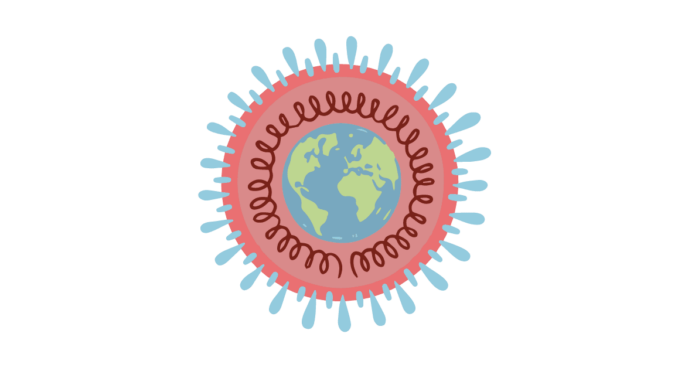
Merrill Singer, PhD, University of Connecticut
The COVID-19 pandemic brought enhanced global attention to the anthropological concept of syndemics. A pivotal moment occurred when Richard Horton, Editor-in-Chief of The Lancet, one of the world’s highest-impact academic journals, declared: COVID-19 is not a pandemic. It is a syndemic. When this assertion by an eminent health scholar appeared in the midst of the global spread of a deadly disease, it garnered widespread interest. Moreover, with regard to syndemics Horton tweeted, “The anthropology community is ahead of medicine and public health.”Once labeled a little-known buzzword that nonetheless describes our troubled times in Smithsonian Magazine, syndemic theory now informs a rich body of health research and interventions. As medical anthropologist Lance Gravlee observed, syndemics has achieved a broader reach than most anthropological ideas. This raises the questions, are we teaching syndemic and how best to do so?

Syndemics are defined as significant local or regional epidemiological events characterized by three core components. Firstly, they involve two or more health problems that cluster together in a population. Secondly, syndemic health conditions adversely interact through various biological or psychological mechanisms or pathways. Lastly, syndemics are promoted by social, structural, and/or anthropogenic environmental forces that precipitate disease clustering and progression increasing the health burden of affected populations.
Teaching about syndemics provides a cross-disciplinary window on the biosocial making of health that has a distinctly anthropological origin. Since its conceptualization in critical health anthropology in the 1990s, syndemic theory has become an innovative framework that has influenced scholarly discourses in multiple health-related disciplines, from biomedicine to social epidemiology to psychology.
Why teach syndemics? Syndemics theory promotes the investigation of the dynamics of persistent health inequities in disadvantaged populations, such as those living in poverty, marginalized racial, ethnic, and sexual minorities, and people subjected to austerity measures and neoliberal restructuring. It also focuses on anthropogenic climate/environment disruptions that drive adverse disease interactions. As syndemics can be traced back in time through bioarcheology and archival research, described in contemporary disease crises through ethnography and epidemiology, and projected into the further as a result of the ongoing cascade of emergent infectious diseases, teaching syndemics allows a wide historic perspective on human health. At the same time, because syndemics occur everywhere in the world, they provide a lens on both global and local health issues, the lifeworlds of diverse populations, and human suffering.
The ten goals to set in teaching syndemics, especially at the graduate level, include:
- Facilitating students understanding of health as a biosocial process, shaped as much by the unequal structure of social relation as by biology.
- Grounding student understanding of pandemics in an awareness of the differences between immediate causes (e.g., the spread of a pathogen) and distal causes (e.g., structural violence and the pathologies of power).
- Preparing students to describe the core characteristics of a syndemic and explain the differences between a syndemic and a co-morbidity or multimorbidity approaches.
- Presenting students with the information needed to identify disease clustering, mechanisms of interaction (disease-disease and disease-context) and core epidemiological data needed for a syndemic analysis.
- Facilitating students ability to understand how qualitative approaches can be used to explain causal pathways that expedite syndemic processes at the individual and population levels.
- Equipping students with the skills needed to develop a design for studying syndemic processes and experiences using mixed methods research that combines robust ethnography with various quantitative and epidemiological approaches.
- Alerting students to the benefits of multidisciplinary team research models in understanding and responding to syndemics.
- Strengthening students’ ability to write recommendations for further research into and for interventions to address syndemic threats to health.
- Familiarizing students with debates and controversies in syndemics research
- Preparing students to critically assess the syndemics literature and discuss the strength and weakness of assigned readings.
To assist faculty in developing courses on syndemics, there exist an array of resources. Books and edited collections include
- Singer, M. 2009, Introduction to Syndemics: A Critical Systems Approach to Public and Community Health. San Francisco, CA: Jossey-Bass, 2009.
- Mendenhall, E. 2014, Syndemic Suffering: Social Distress, Depression, and Diabetes among Mexican Immigrant Women. Walnut Creek, CA: Left Coast Press.
- Lerman, S., Ostrach, B., and Singer, M. Eds. 2017, Foundations of Biosocial Health: Stigma and Illness Interactions and Stigma Syndemics. Lanham, MD: Lexington Books.
- Ostrach, B., Lerman, S. and Singer, M. Eds. 2017, Stigma Syndemics: New Directions in Biosocial Health. Lanham, MD: Lexington Books.
- Inayat, A., Singer, M. and Bulled, N. 2024, COVID-19 Syndemics of the Global South: A World Divided. New York: Routledge.
Electronic search engines like JSTOR, PubMed, Ovid, Web of Science, Google Scholar, and Scopus allow rapid identification of relevant research, literature reviews, and commentaries on syndemics.
YouTube offers access to numerous video presentations on syndemics by invited government, academic, and organizational speakers.
Also of potential use are websites that describe how syndemics has been useful in local, regional, and tribal public health initiatives such as the Indigenous HIV/AIDS Syndemic Strategy (https://www.indiancountryecho.org/indigenous-hiv-aids-syndemic-strategy/).
In sum, syndemics provides a propitious entre to engage an array of issues of strong concern in health anthropology and adjacent fields. Teaching syndemics reveals the role anthropology is playing in tackling prominent threats to health globally.
Merrill Singer, PhD
Senior Research Scientist, Center for Health, Intervention and Prevention
Emeritus Professor, Department of Anthropology, University of Connecticut, USA
Recent Books
Ecocrises Interactions: Human Health and the Changing Environment. New York: Wiley, 2021.
A Companion to Medical Anthropology. 2nd Edition. Merrill Singer, Pamela Erickson, and Cesar E. Abadia-Barrero. Wiley Blackwell, 2022.
COVID-19 Syndemics of the Global South: A World Divided. Inayat Ali, Merrill Singer, and Nicola Bulled. New York: Routledge, 2024.
Building the Critical Anthropology of Climate Change: Towards a Socio-Ecological Revolution. Hans Baer and Merrill Singer. Abingdon, Oxfordshire. UK: Taylor & Francis, 2024.

Leave a Reply
You must be logged in to post a comment.